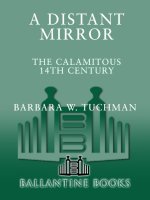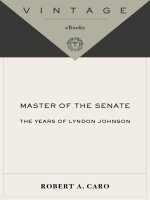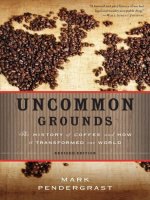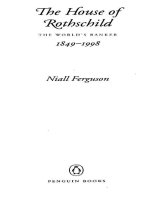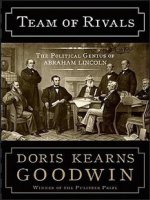Michael shaara the killer angels (v5 0)
Bạn đang xem bản rút gọn của tài liệu. Xem và tải ngay bản đầy đủ của tài liệu tại đây (3.39 MB, 252 trang )
Praise for
The Killer Angels
“The best Civil War novel ever written … The descriptions of combat are incomparable;
they convey not just the sights but the noise and smell of battle. And the
characterizations are simply superb.… Shaara has managed to capture the essence of
war, the divided friendships, the madness, and the heroism of fratricidal conflict.”
—STEPHEN B. OATES, author of With Malice Toward None
“[Shaara] writes with clarity and power.… His descriptions of the battle scenes are vivid
and unsparing.”
—Newsday
“Akin to Hemingway … [and] Stephen Crane’s Red Badge of Courage.”
—The Houston Post
“A compelling version of what America’s Armageddon must have been like … sure re
storytelling.”
—Publishers Weekly
“You will learn more from this utterly absorbing book about Gettysburg than from any
non ctional account. Shaara fabulously, convincingly brings characters such as Robert
E. Lee to life and makes the conflict all too real.”
—Forbes
“Literary wonders will never cease. Would you think it possible that after all the
hundreds of books written about the battle of Gettysburg, both ction and non ction,
that… [this] novel about the battle could come out fresh, utterly absorbing, with the
strong possibility that it may even turn out to be a classic? Well, read Michael
Shaara’s … The Killer Angels and find out.”
—The Frederick News-Post (Frederick, Maryland)
“Narrated as expertly as though Michael Shaara had been a participant in the battle of
Gettysburg.”
—The Journal Gazette (Fort Wayne, Indiana)
“It’s at one and the same time an excellent, historical novel, a bitter anti-war tract, and
a story filled with an amazing case of beautifully realized characters.”
—Daily Sun (Hudson, Massachusetts)
“An approach so fresh it is stunning.”
—St. Louis Globe-Democrat
“The Killers Angels could well be the best Civil War novel of this decade.”
—The News Leader (Richmond, Virginia)
“All in all it is a feast of reading, the best you will find for a long, long time.”
—The Chattanooga Times
“What makes Shaara’s novel an admirable e ort, and one worth reading, is its
sensitiveness to the time-spirit of the era. What it reveals is primarily men in context,
men in action, and thought within the changing scenery of events. It is a genuinely
appealing book.”
—The Charlotte Observer
“This is one of the best novels of the Civil War that I’ve read.”
—Daily Press (Newport News, Virginia)
ALSO BY MICHAEL SHAARA
The Broken Place
The Herald
For Love of the Game
The Killer Angels is a work of historical fiction. Apart from the well-known actual people, events, and locales that figure in
the narrative, all names, characters, places, and incidents are the product of the author’s imagination or are used
fictitiously. Any resemblance to current events or locales, or to living persons, is entirely coincidental.
2011 Ballantine Books Trade Paperback Edition
Copyright © 1974 by Michael Shaara
Copyright renewed © 2002 by Jeff M. Shaara and Lila E. Shaara
All rights reserved.
Published in the United States by Ballantine Books, an imprint of The Random House Publishing Group, a division of
Random House, Inc., New York.
BALLANTINE and colophon are registered trademarks of Random House, Inc.
Originally published in hardcover in the United States by David McKay Co., Inc., an imprint of The Random House
Publishing Group, a division of Random House, Inc., in 1974.
eISBN: 978-0-345-51373-1
www.ballantinebooks.com
Cover design: Michael Boland/Boland Design Company
Cover illustration: Gilbert Gaul, Glorious Fighting, 1885 (detail)(Collection of the Birmingham Museum of Art/Gift of John
Meyer)
Maps by Don Pitcher
v3.1
TO LILA (OLD GEORGE)
… IN WHOM
I AM WELL PLEASED
“When men take up arms to set other men free, there is something sacred and holy in
the warfare.”
—WOODROW WILSON
“I hate the idea of causes, and if I had to choose between betraying my country and
betraying my friend, I hope I should have the guts to betray my country.”
—E.M. FORSTER
“With all my devotion to the Union and the feeling of loyalty and duty of an American
citizen, I have not been able to raise my hand against my relatives, my children, my
home. I have therefore resigned my commission in the Army.…”
—from a letter of ROBERT E. LEE
Mr. Mason: How do you justify your acts?
John Brown: I think, my friend, you are guilty of a great wrong against God and
humanity—I say it without wishing to be o ensive—and it would be perfectly right for
anyone to interfere with you so far as to free those you willfully and wickedly hold in
bondage. I do not say this insultingly.
Mr. Mason: I understand that.
—from an interview with
JOHN BROWN after his capture
CONTENTS
Cover
Other Books by This Author
Title Page
Copyright
Dedication
Epigraph
LIST OF MAPS
TO THE READER
FOREWORD
THE KILLER ANGELS
MONDAY, JUNE 29, 1863
1. THE SPY
2. CHAMBERLAIN
3. BUFORD
4. LONGSTREET
WEDNESDAY, JULY 1, 1863: THE FIRST DAY
1. LEE
2. BUFORD
3. LEE
4. CHAMBERLAIN
5. LONGSTREET
6. LEE
7. BUFORD
THURSDAY, JULY 2, 1863: THE SECOND DAY
1. FREMANTLE
2. CHAMBERLAIN
3. LONGSTREET
4. CHAMBERLAIN
5. LONGSTREET
6. LEE
FRIDAY, JULY 3, 1863
1. CHAMBERLAIN
2. LONGSTREET
3. CHAMBERLAIN
4. ARMISTEAD
5. LONGSTREET
6. CHAMBERLAIN
AFTERWORD
About the Author
LIST OF MAPS
Situation June 1863: the routes of the armies
Situation Noon, June 30: Buford enters Gettysburg
Gettysburg
The First Day—dawn: Buford’s defense of Gettysburg
Situation Evening, June 30
Dawn, July 1
Situation at 9:00 A.M., July I: Buford’s defense
The First Day—11:00 A.M.: situation after the death of Reynolds
The First Day—3:00–4:00 P.M.: attack of Ewell’s Corps on Howard’s flank
Chamberlain’s route to Gettysburg
Situation at the close of the First Day
The Second Day—morning: estimated Union position
The Second Day—morning: Lee’s plan for Longstreet’s assault on the Union left
Longstreet’s Countermarch
The Second Day—4:00 P.M.: actual line attacked by Longstreet after Sickles’ move forward
The Second Day—5:00 P.M.: defense of Devil’s Den and Little Round Top
Situation at the close of the Second Day
The Third Day—2:30 P.M.: Lee’s plan for Pickett’s Charge
TO
THE
READER
This is the story of the Battle of Gettysburg, told from the viewpoints of Robert E. Lee
and James Longstreet and some of the other men who fought there.
Stephen Crane once said that he wrote The Red Badge of Courage because reading the
cold history was not enough; he wanted to know what it was like to be there, what the
weather was like, what men’s faces looked like. In order to live it he had to write it. This
book was written for much the same reason.
You may nd it a di erent story from the one you learned in school. There have been
many versions of that battle and that war. I have therefore avoided historical opinions
and gone back primarily to the words of the men themselves, their letters and other
documents. I have not consciously changed any fact. I have condensed some of the
action, for the sake of clarity, and eliminated some minor characters, for brevity; but
though I have often had to choose between con icting viewpoints, I have not knowingly
violated the action. I have changed some of the language. It was a naïve and
sentimental time, and men spoke in windy phrases. I thought it necessary to update
some of the words so that the religiosity and naïveté of the time, which were genuine,
would not seem too quaint to the modern ear. I hope I will be forgiven that.
The interpretation of character is my own.
MICHAEL SHAARA
FOREWORD
June 1863
I. THE ARMIES
On June 15 the rst troops of the Army of Northern Virginia, Robert E. Lee
commanding, slip across the Potomac at Williamsport and begin the invasion of the
North.
It is an army of seventy thousand men. They are rebels and volunteers. They are
mostly unpaid and usually self-equipped. It is an army of remarkable unity, ghting for
disunion. It is Anglo-Saxon and Protestant. Though there are many men who cannot
read or write, they all speak English. They share common customs and a common faith
and they have been consistently victorious against superior numbers. They have as solid
a faith in their leader as any veteran army that ever marched. They move slowly north
behind the Blue Ridge, using the mountains to screen their movements. Their main
objective is to draw the Union Army out into the open where it can be destroyed. By the
end of the month they are closing on Harrisburg, having spread panic and rage and
despair through the North.
Late in June the Army of the Potomac, ever slow to move, turns north at last to begin
the great pursuit which will end at Gettysburg. It is a strange new kind of army, a
polyglot mass of vastly dissimilar men, fighting for union. There are strange accents and
strange religions and many who do not speak English at all. Nothing like this army has
been seen upon the planet. It is a collection of men from many di erent places who
have seen much defeat and many commanders. They are volunteers: last of the great
volunteer armies, for the draft is beginning that summer in the North. They have lost
faith in their leaders but not in themselves. They think this will be the last battle, and
they are glad that it is to be fought on their own home ground. They come up from the
South, eighty thousand men, up the narrow roads that converge toward the blue
mountains. The country through which they march is some of the most beautiful country
in the Union.
It is the third summer of the war.
II. THE MEN
Robert Edward Lee. He is in his fty-seventh year. Five feet ten inches tall but very short
in the legs, so that when he rides a horse he seems much taller. Red-faced, like all the
Lees, white-bearded, dressed in an old gray coat and a gray felt hat, without insignia, so
that he is mistaken sometimes for an elderly major of dignity. An honest man, a
gentleman. He has no “vices.” He does not drink or smoke or gamble or chase women.
He does not read novels or plays; he thinks they weaken the mind. He does not own
slaves nor believe in slavery, but he does not believe that the Negro, “in the present
stage of his development,” can be considered the equal of the white man. He is a man in
control. He does not lose his temper nor his faith; he never complains. He has been
down that spring with the rst assault of the heart disease which will eventually kill
him. He believes absolutely in God. He loves Virginia above all, the mystic dirt of home.
He is the most beloved man in either army.
He marches knowing that a letter has been prepared by Je erson Davis, a letter
which o ers peace. It is to be placed on the desk of Abraham Lincoln the day after Lee
has destroyed the Army of the Potomac somewhere north of Washington.
James Longstreet, Lieutenant General, forty-two. Lee’s second in command. A large
man, larger than Lee, full-bearded, blue-eyed, ominous, slow-talking, crude. He is one of
the rst of the new soldiers, the cold-eyed men who have sensed the birth of the new
war of machines. He has invented a trench and a theory of defensive warfare, but in
that courtly company few will listen. He is one of the few high o cers in that army not
from Virginia.
That winter, in Richmond, three of his children have died within a week, of a fever.
Since that time he has withdrawn, no longer joins his men for the poker games he once
loved, for which he was famous.
They call him “Old Pete” and sometimes “The Dutchman.” His headquarters is always
near Lee, and men remark upon the intimacy and some are jealous of it. He has
opposed the invasion of Pennsylvania, but once the army is committed he no longer
opposes. Yet he will speak his mind; he will always speak his mind. Lee calls him, with
deep a ection, “my old war horse.” Since the death of Stonewall Jackson he has been
Lee’s right hand. He is a stubborn man.
George Pickett, Major General, forty-two. Gaudy and lovable, longhaired, perfumed.
Last in his class at West Point, he makes up for a lack of wisdom with a lusty
exuberance. In love with a girl half his age, a schoolgirl from Lynchburg named LaSalle
Corbelle, to whom he has vowed ne’er to touch liquor. Received his appointment to West
Point through the good o ces of Abraham Lincoln, a personal friend, and no one now
can insult Abe Lincoln in Pickett’s presence, although Lincoln is not only the enemy but
the absolute utterest enemy of all.
On the march toward Gettysburg Pickett’s Virginia Division is by a trick of fate last in
line. He worries constantly that he will miss the last great battle of the war.
Richard Ewell, Lieutenant General, forty-six. Egg-bald, one-legged, recently married.
(He refers to his new wife absentmindedly as “Mrs. Brown.”) Eccentric, brilliant, chosen
out of all Lee’s o cers to succeed to a portion of Stonewall Jackson’s old command. But
he has lost something along with the leg that a soldier sometimes loses with the big
wounds. He approaches Gettysburg unsure of himself, in command of twenty thousand
men.
Ambrose Powell Hill, Major General, thirty-seven. Has risen to command the other part
of Jackson’s old corps. A moody man, often competent, bad-tempered, wealthy, aspires
to a place in Richmond society, frets and broods and ghts with superiors. He wears a
red shirt into battle. He should be a ne soldier, and sometimes is, but he is often ill for
no apparent reason. He does not like to follow orders. At Gettysburg he will command a
corps, and he will be sick again.
Lewis Armistead, Brigadier General, forty-six. Commander of one of George Pickett’s
brigades. They call him “Lo,” which is short for Lothario, which is meant to be witty, for
he is a shy and silent man, a widower. Descended from a martial family, he has a
ghter’s spirit, is known throughout the old army as the man who, while a cadet at the
Point, was suspended for hitting Jubal Early in the head with a plate. Has developed
over long years of service a deep a ection for Win eld Scott Hancock, who ghts now
with the Union. Armistead looks forward to the reunion with Hancock, which will take
place at Gettysburg.
Richard Brooke Garnett, Brigadier General, forty-four. Commands the second of
Pickett’s brigades. A dark-eyed, silent, tragic man. Followed Jackson in command of the
old Stonewall Brigade; at Kerns-town he has made the mistake of withdrawing his men
from an impossible position. Jackson is outraged, orders a court-martial which never
convenes. Jackson dies before Garnett, accused of cowardice, can clear his name and
redeem his honor, the honor which no man who knows him has ever doubted. He comes
to Gettysburg a tortured man, too ill to walk. He believes that Jackson deliberately lied.
In that camp there is nothing more important than honor.
J. E. B. Stuart, Lieutenant General, thirty. The laughing banjo player, the superb
leader of cavalry who has ridden rings around the Union Army. A ne soldier, whose
reports are always accurate, but a man who loves to read about himself in the Richmond
newspapers. His mission that month is to keep Lee informed of the movement of the
Union Army. He fails.
Jubal Early, Major General, forty-six. Commander of one of Ewell’s divisions. A dark,
cold, icy man, bitter, alone. Left the Point to become a prosecuting attorney, to which
he is well suited. A competent soldier, but a man who works with an eye to the future, a
slippery man, a careful soldier; he will build his reputation whatever the cost. Dick
Ewell defers to him. Longstreet despises him. Lee makes do with the material at hand.
Lee calls him “my bad old man.”
These men wore blue:
Joshua Lawrence Chamberlain, Colonel, thirty-four. He prefers to be called “Lawrence.”
A professor of rhetoric at Bowdoin University, sometime professor of “Natural and
Revealed Religion,” successor to the chair of the famed Professor Stowe, husband to
Harriet Beecher. Tall and rather handsome, attractive to women, somewhat boyish, a
clean and charming person. An excellent student, Phi Beta Kappa, he speaks seven
languages and has a beautiful singing voice, but he has wanted all his life to be a
soldier. The university will not free him for war, but in the summer of 1862 he requests
a sabbatical for study in Europe. When it is granted he proceeds not to France but to the
o ce of the Governor of Maine, where he receives a commission in the 20th Regiment
of Infantry, Maine Volunteers, and marches o to war with a vast faith in the
brotherhood of man. Spends the long night at Fredericksburg piling corpses in front of
himself to shield him from bullets. Comes to Gettysburg with that hard fragment of the
Regiment which has survived. One week before the battle he is given command of the
regiment. His younger brother Thomas becomes his aide. Thomas too has yearned to be
a soldier. The wishes of both men are to be granted on the dark rear slope of a small
rocky hill called Little Round Top.
John Buford, Major General, thirty-seven. A cavalry soldier, restless and caged in the
tamed and political East, who loves the great plains and the memory of snow. A man
with an eye for the good ground, already badly wounded and not long to live, weary of
stupidity and politics and bloody military greed. At Thorofare Gap he held against
Longstreet for six hours, waiting for help that never came. Too good an o cer for his
own advancement, he rides a desk in Washington until luck puts him back in the eld,
where he is given two brigades of cavalry and told to trail Lee’s army. He is rst into
Gettysburg, where he lifts up his eyes to the hills. He is a man who knows the value of
ground.
John Reynolds, Major General, forty-two. Perhaps the finest soldier in the Union Army.
Like Lee before him, a former commander of West Point, a courteous man, military, a
marvelous horseman, another gentleman. His home is not far from Gettysburg. He has
fallen in love late in life, but the girl is Catholic and Reynolds has not yet told his
Protestant family, but he wears her ring on a chain around his neck, under his uniform.
Early that month he is called to Washington, where he is o ered command of the army.
But he has seen the military results of maneuvering by armchair commanders Halleck
and Stanton, and he insists that the army cannot be commanded from Washington, that
he cannot accept command without a free hand. He therefore respectfully declines. The
honor passes to George Meade, who is not even given the option but ordered to
command. And thus it is John Reynolds, not Meade, who rides into Gettysburg on the
morning of the First Day.
George Gordon Meade, Major General, forty-seven. Vain and bad-tempered, balding,
full of self-pity. He takes command of the army on a Sunday, June 28, two days before
the battle. He wishes to hold a Grand Review, but there turns out not to be time. He
plans a line of defense along Pipe Creek, far from Gettysburg, in the unreal hope that
Lee will attack him on ground of his own choosing. No decision he makes at Gettysburg
will be decisive, except perhaps the last.
Win eld Scott Hancock, Major General, thirty-nine. Armistead’s old friend. A magnetic
man with a beautiful wife. A painter of talent, a picture-book general. Has a tendency
to gain weight, but at this moment he is still young and slim, still a superb presence, a
man who arrives on the battle eld in spotlessly clean linen and never keeps his head
down. In the ght to come he will be everywhere, and in the end he will be waiting for
Lew Armistead at the top of Cemetery Hill.
—
All that month there is heat and wild rain. Cherries are ripening over all Pennsylvania,
and the men gorge as they march. The civilians have ed and houses are dark. The
armies move north through the heat and the dust.
MONDAY,
JUNE 29, 1863
Mine eyes have seen the glory …
1.
THE SPY
He rode into the dark of the woods and dismounted. He crawled upward on his belly
over cool rocks out into the sunlight, and suddenly he was in the open and he could see
for miles, and there was the whole vast army below him, lling the valley like a
smoking river. It came out of a blue rainstorm in the east and over owed the narrow
valley road, coiling along a stream, narrowing and choking at a white bridge, fading
out into the yellowish dust of June but still visible on the farther road beyond the blue
hills, spiked with ags and guidons like a great chopped bristly snake, the snake ending
headless in a blue wall of summer rain.
The spy tucked himself behind a boulder and began counting ags. Must be twenty
thousand men, visible all at once. Two whole Union Corps. He could make out the
familiar black hats of the Iron Brigade, troops belonging to John Reynolds’s First Corps.
He looked at his watch, noted the time. They were coming very fast. The Army of the
Potomac had never moved this fast. The day was murderously hot and there was no
wind and the dust hung above the army like a yellow veil. He thought: there’ll be some
of them die of the heat today. But they are coming faster than they ever came before.
He slipped back down into the cool dark and rode slowly downhill toward the silent
empty country to the north. With luck he could make the Southern line before nightfall.
After nightfall it would be dangerous. But he must not seem to hurry. The horse was
already tired. And yet there was the pressure of that great blue army behind him,
building like water behind a cracking dam. He rode out into the open, into the land
between the armies.
There were fat Dutch barns, prim German orchards. But there were no cattle in the
elds and no horses, and houses everywhere were empty and dark. He was alone in the
heat and the silence, and then it began to rain and he rode head down into monstrous
lightning. All his life he had been afraid of lightning but he kept riding. He did not know
where the Southern headquarters was but he knew it had to be somewhere near
Chambersburg. He had smelled out the shape of Lee’s army in all the rumors and bar
talk and newspapers and hysteria he had drifted through all over eastern Pennsylvania,
and on that day he was perhaps the only man alive who knew the positions of both
armies. He carried the knowledge with a hot and lovely pride. Lee would be near
Chambersburg, and wherever Lee was Longstreet would not be far away. So nding the
headquarters was not the problem. The problem was riding through a picket line in the
dark.
The rain grew worse. He could not even move in under a tree because of the
lightning. He had to take care not to get lost. He rode quoting Shakespeare from
memory, thinking of the picket line ahead somewhere in the dark. The sky opened and
poured down on him and he rode on: It will be rain tonight: Let it come down. That was a
speech of murderers. He had been an actor once. He had no stature and a small voice
and there were no big parts for him until the war came, and now he was the only one
who knew how good he was. If only they could see him work, old cold Longstreet and
the rest. But everyone hated spies. I come a single spy. Wet single spy. But they come in
whole battalions. The rain began to ease o and he spurred the horse to a trot. My
kingdom for a horse. Jolly good line. He went on, reciting Henry the Fifth aloud: “Once
more into the breech …”
Late that afternoon he came to a crossroad and the sign of much cavalry having
passed this way a few hours ago. His own way led north to Chambersburg, but he knew
that Longstreet would have to know who these people were so close to his line. He
debated a moment at the crossroads, knowing there was no time. A delay would cost
him daylight. Yet he was a man of pride and the tracks drew him. Perhaps it was only
Jeb Stuart. The spy thought hopefully, wistfully: If it’s Stuart I can ask for an armed
escort all the way home. He turned and followed the tracks. After a while he saw a
farmhouse and a man standing out in a eld, in a peach orchard, and he spurred that
way. The man was small and bald with huge round arms and spoke very bad English.
The spy went into his act: a simple-minded farmer seeking a runaway wife, terri ed of
soldiers. The bald man regarded him sweatily, disgustedly, told him the soldiers just
gone by were “plu” soldiers, Yankees. The spy asked: What town lies yonder? and the
farmer told him Gettysburg, but the name meant nothing. The spy turned and spurred
back to the crossroads. Yankee cavalry meant John Buford’s column. Moving licketysplit. Where was Stuart? No escort now. He rode back again toward the blue hills. But
the horse could not be pushed. He had to dismount and walk.
That was the last sign of Yankees. He was moving up across South Mountain; he was
almost home. Beyond South Mountain was Lee and, of course, Longstreet. A strange
friendship: grim and gambling Longstreet, formal and pious old Bobby Lee. The spy
wondered at it, and then the rain began again, bringing more lightning but at least
some cooler air, and he tucked himself in under his hat and went back to Hamlet. Old
Jackson was dead. Good night, sweet Prince, and flights of angels sing thee to thy rest …
He rode into darkness. No longer any need to hurry. He left the roadway at last and
moved out into a eld away from the lightning and the trees and sat in the rain to eat a
lonely supper, trying to make up his mind whether it was worth the risk of going on. He
was very close; he could begin to feel them up ahead. There was no way of knowing
when or where, but suddenly they would be there in the road, stepping phantomlike out
of the trees wearing those sick eerie smiles, and other men with guns would suddenly
appear all around him, prodding him in the back with hard steel barrels, as you prod an
animal, and he would have to be lucky, because few men rode out at night on good and
honest business, not now, this night, in this invaded country.
He rode slowly up the road, not really thinking, just moving, reluctant to stop. He
was weary. Fragments of Hamlet ickered in his brain: If it be not now, yet it will come.
Ripeness is all. Now there’s a good part. A town ahead. A few lights. And then he struck
the picket line.
There was a presence in the road, a liquid Southern voice. He saw them outlined in
lightning, black ragged gures rising around him. A sudden lantern poured yellow light.
He saw one bleak hawkish grinning face; hurriedly he mentioned Longstreet’s name.
With some you postured and with some you groveled and with some you were
imperious. But you could do that only by daylight, when you could see the faces and
gauge the reaction. And now he was too tired and cold. He sat and shuddered: an
insigni cant man on a pale and muddy horse. He turned out to be lucky. There was a
patient sergeant with a long gray beard who put him under guard and sent him along
up the dark road to Longstreet’s headquarters.
He was not safe even now, but he could begin to relax. He rode up the long road
between picket res, and he could hear them singing in the rain, chasing each other in
the dark of the trees. A fat and happy army, roasting meat and fresh bread, telling
stories in the dark. He began to fall asleep on the horse; he was home. But they did not
like to see him sleep, and one of them woke him up to remind him, cheerily, that if there
was no one up there who knew him, why, then, unfortunately, they’d have to hang him,
and the soldier said it just to see the look on his face, and the spy shivered, wondering,
Why do there have to be men like that, men who enjoy another man’s dying?
—
Longstreet was not asleep. He lay on the cot watching the lightning are in the door of
the tent. It was very quiet in the grove and there was the sound of the raindrops
continuing to fall from the trees although the rain had ended. When Sorrel touched him
on the arm he was glad of it; he was thinking of his dead children.
“Sir? You asked to be awakened if Harrison came back.”
“Yes.” Longstreet got up quickly and put on the old blue robe and the carpet slippers.
He was a very big man and he was full-bearded and wild-haired. He thought of the last
time he’d seen the spy, back in Virginia, tiny man with a face like a weasel: “And where
will your headquarters be, General, up there in Pennsylvania? ’Tis a big state indeed.”
Him standing there with cold gold clutched in a dirty hand. And Longstreet had said
icily, cheerily, “It will be where it will be. If you cannot nd the headquarters of this
whole army you cannot be much of a spy.” And the spy had said sti y, “Scout, sir. I am
a scout. And I am a patriot, sir.” Longstreet had grinned. We are all patriots. He stepped
out into the light. He did not know what to expect. He had not really expected the spy
to come back at all.
The little man was there: a soggy spectacle on a pale and spattered horse. He sat
grinning wanly from under the oppy brim of a soaked and dripping hat. Lightning
flared behind him; he touched his cap.
“Your servant, General. May I come down?”
Longstreet nodded. The guard backed o . Longstreet told Sorrel to get some co ee.
The spy slithered down from the horse and stood grinning foolishly, shivering, mouth
slack with fatigue.
“Well, sir—” the spy chuckled, teeth chattering “—you see, I was able to find you after
all.”
Longstreet sat at the camp table on a wet seat, extracted a cigar, lighted it. The spy
sat floppily, mouth still open, breathing deeply.
“It has been a long day. I’ve ridden hard all this day.”
“What have you got?”
“I came through the pickets at night, you know. That can be very touchy.”
Longstreet nodded. He watched, he waited. Sorrel came with steaming co ee; the cup
burned Longstreet’s fingers. Sorrel sat, gazing curiously, distastefully at the spy.
The spy guzzled, then sni ed Longstreet’s fragrant smoke. Wistfully: “I say, General, I
don’t suppose you’ve got another of those? Good Southern tobacco?”
“Directly,” Longstreet said. “What have you got?”
“I’ve got the position of the Union Army.”
Longstreet nodded, showing nothing. He had not known the Union Army was on the
move, was within two hundred miles, was even this side of the Potomac, but he nodded
and said nothing. The spy asked for a map and began pointing out the positions of the
corps.
“They’re coming in seven corps. I gure at least eighty thousand men, possibly as
much as a hundred thousand. When they’re all together they’ll outnumber you, but
they’re not as strong as they were; the two-year enlistments are running out. The First
Corps is here. The Eleventh is right behind it. John Reynolds is in command of the lead
elements. I saw him at Taneytown this morning.”
“Reynolds,” Longstreet said.
“Yes, sir.”
“You saw him yourself?”
The spy grinned, nodded, rubbed his nose, chuckled. “So close I could touch him. It
was Reynolds all right.”
“This morning. At Taneytown.”
“Exactly. You didn’t know any of that, now did you, General?” The spy bobbed his
head with delight. “You didn’t even know they was on the move, did ye? I thought not.
You wouldn’t be spread out so thin if you knowed they was comin’.”
Longstreet looked at Sorrel. The aide shrugged silently. If this was true, there would
have been some word. Longstreet’s mind moved over it slowly. He said: “How did you
know we were spread out?”
“I smelled it out.” The spy grinned, foxlike, toothy. “Listen, General, I’m good at this
business.”
“Tell me what you know of our position.”
“Well, now I can’t be too exact on this, ’cause I aint scouted you myself, but I gather
that you’re spread from York up to Harrisburg and then back to Chambersburg, with the
main body around Chambersburg and General Lee just ’round the bend.”
It was exact. Longstreet thought: if this one knows it, they will know it. He said
slowly, “We’ve had no word of Union movement.”
The spy bobbed with joy. “I knew it. Thass why I hurried. Came through that picket
line in the dark and all. I don’t know if you realize, General—”
Sorrel said coldly, “Sir, don’t you think, if this man’s story was true, that we would
have heard something?”
Sorrel did not approve of spies. The spy grimaced, blew. “You aint exactly on friendly
ground no more, Major. This aint Virginia no more.”
True, Longstreet thought. But there would have been something. Stuart? Longstreet
said, “General Stuart’s cavalry went out a few days back. He hasn’t reported any
movement.”
The spy shrugged, exasperated, glooming at Sorrel. Sorrel turned his back, looked at
his fingernails.
Longstreet said, “What have you heard of Stuart?”
“Not much. He’s riding in the north somewhere. Stirring up headlines and fuss, but I
never heard him do any real damage.”
Longstreet said, “If the Union Army were as close as you say, one would think—”
“Well, I’m damned,” the spy said, a small rage aming. “I come through that picket
line in the dark and all. Listen, General, I tell you this: I don’t know what old Stuart is
doing and I don’t care, but I done my job and this is a fact. This here same afternoon of
this here day I come on the tracks of Union cavalry thick as eas, one whole brigade
and maybe two, and them bluebellies weren’t no four hours hard ride from this here
now spot, and that, by God, is the Lord’s truth.” He blew again, meditating. Then he
added, by way of amendment, “Buford’s column, I think it was. To be exact.”
Longstreet thought: can’t be true. But he was an instinctive man, and suddenly his
brain knew and his own temper boiled. Jeb Stuart … was joyriding. God damn him.
Longstreet turned to Sorrel.
“All right, Major. Send to General Lee. I guess we’ll have to wake him up. Get my
horse.”
Sorrel started to say something, but he knew that you did not argue with Longstreet.
He moved.
The spy said delightedly, “General Lee? Do I get to see General Lee? Well now.” He
stood up and took o the ridiculous hat and smoothed wet plastered hair across a
balding skull. He glowed. Longstreet got the rest of the information and went back to
his tent and dressed quickly.
If the spy was right the army was in great danger. They could be cut apart and cut o
from home and destroyed in detail, piece by piece. If the spy was right, then Lee would
have to turn, but the old man did not believe in spies nor in any information you had to
pay for, had not approved of the money spent or even the idea behind it. And the old
man had faith in Stuart, and why in God’s name had Stuart sent nothing, not even a
courier, because even Stuart wasn’t fool enough to let the whole damned Army of the
Potomac get this close without word, not one damned lonesome word. Longstreet went
back out into the light. He had never believed in this invasion. Lee and Davis together
had overruled him. He did not believe in o ensive warfare when the enemy
outnumbered you and outgunned you and would come looking for you anyway if you
waited somewhere on your own ground. He had not argued since leaving home, but the
invasion did not sit right in his craw; the whole scheme lay edgewise and raspy in his
brain, and treading here on alien ground, he felt a cold wind blowing, a distant alarm.
Only instinct. No facts as yet. The spy reminded him about the cigar. It was a short way
through the night to Lee’s headquarters, and they rode past low sputtering camp res
with the spy puffing exuberant blue smoke like a happy furnace.
“ ’Tis a happy army you’ve got here, General,” the spy chatted with approval. “I felt it
the moment I crossed the picket line. A happy army, eager for the ght. Singing and all.
You can feel it in the air. Not like them bluebellies. A desperate tired lot. I tell you,
General, this will be a factor. The bluebellies is almost done. Why, do you know what I
see everywhere I go? Disgraceful, it is. On every street in every town, able-bodied men.
Just standing there, by the thousands, reading them poor squeaky pitiful newspapers
about this here mighty invasion and the last gasp of the Union and how every man must
take up arms, haw.” The spy gu awed. “Like a bunch of fat women at church. The war’s
almost over. You can feel it, General. The end is in the air.”
Longstreet said nothing. He was beginning to think of what to do if the spy was right.
If he could not get Lee to turn now there could be disaster. And yet if the Union Army
was truly out in the open at last there was a great opportunity: a sudden move south,
between Hooker and Washington, cut them off from Lincoln. Yes. Longstreet said, “What
do you hear of Hooker? Where is he?”
The spy stopped, mouth sagging. “Oh by Jesus. Forgive me.” He grimaced, shook his
head. “I done forgot. There was an item in the newspaper this morning. Saying that
Hooker was replaced. They gave the command to Meade, I think it was.”
“George Meade?”
“Yes, sir. I think.”
“You’re sure?”
“Well, it was Meade the newspaper said, but you know them damn newspapers.”
Longstreet thought: new factor. He spurred the horse, but he couldn’t move fast
because of the dark. Lee must listen. God bless the politicians. Reynolds was their best
man. Why did they go to Meade? But I’m sorry to see Hooker go. Old Fighting Joe.
Longstreet said, “It was Meade, then, and not Reynolds?”
“Rumor was that Reynolds was o ered the job but wouldn’t have it on a plate. That’s
what the paper said.”
Old John’s too smart to take it. Not with that idiot Halleck pulling the strings. But
Meade? Fussy. Engineer. Careful. No genius for sure. But a new factor. A Pennsylvania
man. He will know this country.
The spy chatted on amiably. He seemed to need to talk. He was saying, “Strange thing
about it all, thing that bothers me is that when you do this job right nobody knows
you’re doing it, nobody ever watches you work, do you see? And sometimes I can’t help
but wish I had an audience. I’ve played some scenes, ah, General, but I’ve been lovely.”
The spy sighed, pu ed, sighed again. “This current creation, now, is marvelous. I’m a
poor half-witted farmer, do you see, terri ed of soldiers, and me lovely young wife has
run off with a drummer and I’m out a-scourin’ the countryside for her, a sorrowful pitiful
sight I am. And people lookin’ down their noses and grinnin’ behind me back and all the
time tellin’ me exactly what I want to know about who is where and how many and
how long ago, and them not even knowin’ they’re doin’ it, too busy feelin’
contemptuous. There are many people, General, that don’t give a damn for a human
soul, do you know that? The strange thing is, after playing this poor fool farmer for a
while I can’t help but feel sorry for him. Because nobody cares.”
They came to Lee’s camp, in the grove just south of Chambersburg. By the time they
got there Longstreet knew that the spy was telling the truth. Young Walter Taylor was
up, annoyed, prissy, defending General Lee’s night’s rest even against Longstreet, who
glowed once with the beginning of rage, and sent Taylor o to get the old man out of
bed. They dismounted and waited. The spy sat under an awning, grinning with joy at
the prospect of meeting Lee. Longstreet could not sit down. He disliked getting the old
man up: Lee had not been well. But you could lose the war up here. Should have gone to
Vicksburg. News from there very bad. It will fall, and after that … we must win here if
we are to win at all, and we must do it soon. The rain touched him; he shivered. Too
damn much rain would muck up the roads.
Lee came out into the light. The spy hopped to attention. Lee bowed slightly, stiffly.
“Gentlemen.”
He stood bareheaded in the rain: regal, formal, a beautiful white-haired, whitebearded old man in a faded blue robe. He looked haggard. Longstreet thought: He looks
older every time you see him. For a moment the spy was silent, enraptured, then he
bowed suddenly from the waist, widely, formally, gracefully, plucking the oppy hat
from the balding head and actually sweeping the ground with it, dandy, ridiculous,
something off a stage somewhere designed for a king.
“General,” the spy said grandly, “à votre service.” He said something else in a strange
and Southern French. Longstreet was startled at the transformation.
Lee glanced at Longstreet: a silent question. Longstreet said, “Beg pardon, sir. I
thought this urgent. The man has information.”
Lee looked at the spy silently. His face showed nothing. Then he said formally, “Sir,
you must excuse me, I do not know your name.”
“The name is Harrison, sir, at present.” The spy grinned toothily. “The name of an exPresident, ex-general. A small joke, sir. One must keep one’s sense of humor.”
Lee glanced again at Longstreet. Longstreet said, “The man has the position of the
Union Army. He says they are very close. I have a map.”
He moved to the map table, under the awning. The spy followed with reproach. Lee
came slowly to the table, watching the man. After a moment he said to Harrison, “I
understand that you are General Longstreet’s—” a slight pause “—‘scout.’ ” Lee would
not use the word spy. “I believe we saw you last back in Virginia.”
“That’s a fact,” the spy worshipped. “I been kind of circulatin’ since, amongst the
bluebellies, and I tell you, General, sir, that it’s an honor and a priv—”
Longstreet said, “He claims their lead elements are here. He says there is a column of
strong Union cavalry not four hours off.”
Lee looked at the map. Then he sat down and looked more closely. Longstreet gave

